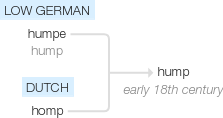Hump
early 18th century: probably related to Low German humpe ‘hump’, also to Dutch homp, Low German humpe ‘lump, hunk (of bread)’.
wiktionary
Probably borrowed from Dutch homp(“hump, lump”) or Middle Low German hump(“heap, hill, stump”), from Old Saxon *hump(“hill, heap, thick piece”), from Proto-Germanic *humpaz(“hip, height”), from Proto-Indo-European *kumb-(“curved”).
etymonline
hump (n.)
1680s (in hump-backed), of uncertain origin; perhaps from Dutch homp "lump," from Middle Low German hump "bump," from Proto-Germanic *hump-, from PIE *kemb- "to bend, turn, change, exchange" (see change (v.)). Replaced, or perhaps influenced by, crump, from Old English crump.
A meaning attested from 1901 is "mound in a railway yard over which cars must be pushed," which might be behind the figurative sense of "critical point of an undertaking" (1914). By 1957, hump day was in use in reference to the mid-point of a training program or course; it was extended to "Wednesday," as the mid-point of the work-week, by 1987.
hump (v.)
"to bend or raise into a hump," 1840, from hump (n.). Meaning "do the sex act with" is attested from 1785, but the source indicates it is an older word. Related: Humped; humper; humping.
